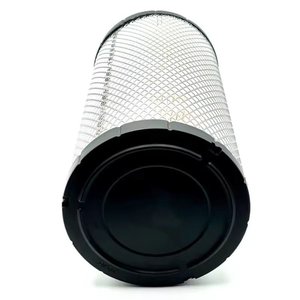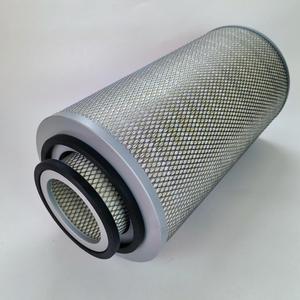Types of JCB Air Filter
JCB air filters are essential components in construction machinery that maintain engine health by trapping dust and debris before they reach the engine. By ensuring the engine draws clean air, these filters optimize performance, extend engine life, and reduce operational costs over time. Understanding the different types available helps in selecting the right filter for specific equipment needs.
Panel Air Filters
Made of pleated filter paper with rectangular frames composed of rubber or polyurethane. These filters are installed in an air box and effectively trap contaminants in their pleats as air flows through to the engine.
Best for: Equipment requiring rectangular filter designs with efficient airflow patterns
Cylindrical Air Filters
Featuring a tube-like shape, these filters are commonly used in JCB 3CX backhoe loaders. They utilize a synthetic fiber wound mesh as the first defense layer, followed by a pleated paper element that provides a larger surface area for capturing contaminants.
Best for: Heavy-duty applications with significant dust exposure
Tapered Air Filters
Cone-shaped filters with a wide top base tapering to a smaller bottom diameter. This design reduces turbulence and improves airflow into the engine. Commonly used in JCB 4CX models to enhance performance through steady clean air delivery.
Best for: Applications requiring optimized airflow dynamics
Oil Bath Air Filters
These use engine oil to trap contaminants, with a reservoir at the bottom holding the oil. As air passes through, particles are captured in the oil. A metal mesh element prevents large debris from entering the oil reservoir. These filters offer extended maintenance intervals due to their durable construction.
Best for: Long-term operation with minimal maintenance requirements
Pre-cleaners
Installed as the first stage in air intake systems for extremely dusty environments. Pre-cleaners remove large debris before it reaches the main filter, extending the primary filter's lifespan by reducing its contaminant load.
Best for: Equipment operating in highly contaminated or dusty conditions
Relative Filtration Efficiency Comparison
Specifications and Maintenance of JCB Air Filters
JCB air filters vary widely based on the specific vehicle requirements. While each model has unique specifications, understanding the general characteristics helps in proper selection and maintenance.
Material
JCB air filters utilize high-quality filter paper that delivers excellent filtration performance while maintaining durability. This specialized material effectively traps dust particles while allowing sufficient airflow to maintain engine performance.
Size and Dimensions
Available in various sizes with specific outer diameters, inner diameters, and heights to match different JCB machine models. Proper sizing is critical for ensuring correct fitment and optimal performance.
Filtration Efficiency
Premium JCB air filters achieve up to 99% filtration efficiency, removing airborne particles, dust, and debris before they enter the engine. This high performance significantly extends engine life and maintains optimal operation.
Application Range
Primarily designed for JCB machinery but often compatible with other heavy-duty diesel engines. These filters excel in industrial, agricultural, and construction applications where demanding conditions require reliable filtration.
Essential Maintenance Guidelines
- Conduct weekly inspections to identify damage or excessive dirt accumulation
- Replace filters immediately upon signs of wear, tears, or performance issues
- Always use genuine JCB filters for replacements to ensure proper fit and functionality
- Follow manufacturer's maintenance schedule and replacement procedures
- Clean the air filter housing thoroughly during filter changes
- Inspect and replace sealing rings if they show signs of wear or damage
- Consider environmental conditions when establishing maintenance intervals
| Maintenance Task | Frequency | Importance | Notes |
|---|---|---|---|
| Visual Inspection | Weekly | High | Check for visible damage or excessive dirt |
| Housing Cleaning | During filter replacement | Medium | Remove accumulated debris from housing |
| Filter Replacement | Every 500-1000 hours* | Critical | Earlier in dusty conditions |
| Seal Inspection | During filter replacement | High | Replace damaged seals immediately |
| Pre-cleaner Service | Every 100 hours | Medium | More frequently in extreme conditions |
*Varies by machine model and operating conditions
How to Choose JCB Air Filters
Selecting the appropriate air filter for your JCB machinery requires careful consideration of several key factors. Making an informed choice ensures optimal engine performance, extends equipment life, and maximizes operational efficiency.
Critical Selection Factors
| Selection Factor | Importance | Considerations |
|---|---|---|
| JCB Machine Model | Critical | Different machines require specific filter types and dimensions |
| Engine Type | High | Diesel engines need robust filtration compared to gasoline engines |
| Filter Quality | High | Premium filters offer better protection and longer service life |
| Operating Environment | High | Dusty conditions require higher-efficiency filters or pre-cleaners |
| Price Considerations | Medium | Balance quality with budget constraints for best value |
JCB Machine Model Compatibility
Each JCB model has specific engine requirements and air intake system configurations. Always verify exact model compatibility when selecting an air filter to ensure proper fit and function.
Tip: Refer to your operator's manual for the precise filter part number
Engine Requirements
Diesel engines in JCB equipment typically generate more particles and require more robust filtration systems than gasoline engines. Understanding your specific engine's filtration needs is essential for proper selection.
Note: Newer Tier 4/Stage V engines may have specialized filtration requirements
Quality vs. Cost Balance
While premium filters may cost more initially, they typically provide superior protection, longer service intervals, and better engine preservation. This often translates to lower total cost of ownership over time.
ROI: Higher quality filters can reduce engine repair costs by up to 30%
Environmental Factors
Equipment operating in extremely dusty conditions may benefit from specialized filter systems with pre-cleaners. Consider your typical operating environment when selecting filter type and replacement intervals.
Recommendation: Use dual-stage filtration in high-dust environments
DIY Replacement of JCB Air Filters
Replacing JCB air filters is a straightforward maintenance task that can be performed with basic mechanical skills and minimal tools. Regular filter replacement helps maintain engine performance and prevents costly repairs.
Required Tools:
- Socket wrench or screwdriver (appropriate for your filter housing)
- New genuine JCB air filter (correct part number for your model)
- Clean, lint-free cloth or paper towels
- Compressed air (optional, for housing cleaning)
- Safety glasses and gloves
Step-by-Step Replacement Procedure:
- Ensure the JCB machine is turned off, on level ground, with the key removed from the ignition
- Locate and access the air filter housing within the engine compartment
- Remove fasteners (bolts, clamps, or screws) securing the air filter housing cover
- Carefully remove the housing cover, noting its orientation for reinstallation
- Gently extract the old air filter, avoiding dropping debris into the air intake
- Inspect the housing for dirt or damage, cleaning thoroughly with a cloth
- Check the condition of the housing seal and replace if damaged
- Insert the new air filter, ensuring it sits properly in the housing
- Reattach the housing cover and secure all fasteners to proper tightness
- Start the machine and verify normal operation with no warning lights
Professional Tips for Filter Replacement
- Never clean and reuse paper element filters unless specifically designed as washable
- Check for proper filter seating before closing the housing to prevent unfiltered air bypass
- Document filter replacement dates and hours in your maintenance log
- Consider replacing both primary and secondary filters simultaneously
- Inspect connecting hoses and clamps while the filter is removed
- When operating in extremely dusty conditions, check filters more frequently
- Listen for unusual noises during initial startup after filter replacement
Frequently Asked Questions
The JCB air filter is a critical component that purifies incoming air before it reaches the engine. By trapping dust, debris, and particulate matter, the filter prevents abrasive particles from entering the engine cylinders where they could cause accelerated wear, reduced performance, and potential damage. Properly functioning air filters help maintain optimal engine performance, improve fuel efficiency, reduce emissions, and significantly extend engine life.
JCB air filter replacement intervals vary based on operating conditions, equipment type, and usage patterns. As a general guideline:
- Regular inspection: Every 250 operating hours or every three months
- Standard replacement: Every 1,000 operating hours or annually
- Severe conditions (dusty environments): Every 500 hours or as indicated by restriction indicators
Always follow the manufacturer's recommendations in your specific equipment manual, as newer models may have different service intervals.
While aftermarket filters are available, genuine JCB air filters are specifically engineered to exact specifications for your equipment. Non-genuine filters may:
- Have inconsistent filtration efficiency, potentially allowing harmful particles into the engine
- Not fit precisely, creating gaps that allow unfiltered air to bypass the filter
- Use inferior materials that degrade faster under operating conditions
- Potentially void warranty coverage on newer equipment
For optimal performance and equipment longevity, genuine JCB filters are recommended, especially for equipment under warranty.
Most standard JCB paper element air filters are designed for replacement, not cleaning. Attempting to clean these filters can damage the filter media and reduce filtration efficiency. However:
- Some specialized filters with foam or cotton gauze elements may be cleanable (check manufacturer instructions)
- Metal mesh pre-cleaners can typically be cleaned and reused
- If cleaning is permitted, use only approved methods and products
When in doubt, replacement is the safest option to ensure proper engine protection.
Several indicators suggest an air filter requires immediate attention:
- Reduced engine power or sluggish performance, particularly under load
- Increased fuel consumption without changes in operation patterns
- Black smoke from the exhaust during acceleration
- Filter restriction indicator showing warning (if equipped)
- Visible damage, dirt saturation, or oil contamination on the filter
- Unusual engine sounds or rough idling
- Warning lights related to engine performance
Prompt inspection and replacement of compromised filters can prevent more serious engine issues.




























































































































































































































































 浙公网安备 33010002000092号
浙公网安备 33010002000092号 浙B2-20120091-4
浙B2-20120091-4